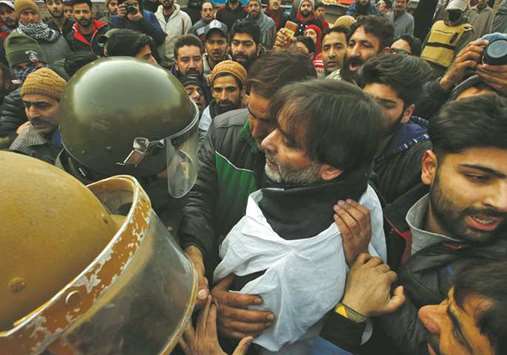Authorities locked down parts of Jammu and Kashmir yesterday as police fired tear gas at protesters defying a curfew to march against the shooting death of seven civilians.
Separatist leaders had urged the public to march on military headquarters in the state, after seven people were killed and dozens wounded in army fire on Saturday.
Authorities took no chances in a region where protests frequently descend into bloodshed, barricading roads to the key army base with razor wire and armoured vehicles.
A total curfew was imposed in parts of Srinagar to try and curb any unrest.
Mobile Internet services were also suspended in some areas, and train services shut down to prevent protesters from massing in numbers.
“Restrictions are in place in some city areas and in Pulwama,” Inspector General of Police Swayam Prakash Pani said, referring to Srinagar and the southern district where Saturday’s shooting occurred.
Police fired tear gas to drive back dozens of protesters led by a key separatist leader who tried to reach the base in central Srinagar.
Yasin Malik, chief of the Jammu Kashmir Liberation Front, was detained by police.
Other key separatist leaders were put under house arrest to stop them marshalling other protesters.
Businesses and schools across the state were closed for a third straight day, with final year school exams delayed.
The army urged the public to ignore the call to protest and blamed Pakistan for stoking unrest.
“Indian Army strongly condemns this call by Pak(istan) proxies and advises people not to fall prey to such designs of anti-national forces,” an army spokesman said in a statement issued late Sunday.
Saturday’s shooting ignited fresh anger across the state, which has witnessed its bloodiest year since 2009 and increasingly violent public opposition to Indian rule.
Popular support for rebels fighting for independence or a merger with Pakistan has grown in recent years and villagers, sometimes in their thousands, swarm the sites of gunbattles with government forces to assist insurgents. The weekend violence also saw three armed rebels and a soldier killed in a shootout.
Meenakshi Ganguly, South Asia director at Human Rights Watch, said Indian authorities should investigate and prosecute those responsible for “indiscriminate use of force”.

Police try to detain Mohamed Yasin Malik, chairman of Jammu Kashmir Liberation Front (JKLF) during a protest march in Srinagar yesterday.
